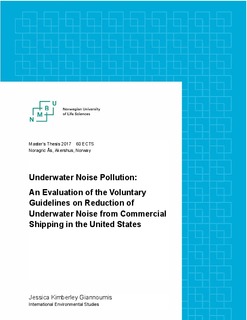| dc.contributor.advisor | Vatn, Arild | |
| dc.contributor.author | Giannoumis, Jessica Kimberley | |
| dc.date.accessioned | 2017-07-19T08:06:08Z | |
| dc.date.available | 2017-07-19T08:06:08Z | |
| dc.date.issued | 2017 | |
| dc.identifier.uri | http://hdl.handle.net/11250/2448967 | |
| dc.description.abstract | The threat of underwater noise pollution was recognized by the International Maritime Organization (IMO) which adopted the voluntary guidelines for the reduction of underwater noise from commercial shipping to address adverse impacts on marine life in 2014. Underwater noise pollution is a transboundary pollutant caused by cavitation of ship propellers which disturbs the behavior of marine mammals. This thesis investigates international and United States national regulations and their demands regarding actions to reduce underwater noise pollution. Additionally, the thesis examines the process of establishing the voluntary guidelines at the IMO and the ways in which political, economic, and civil society actors evaluate the voluntary guidelines. Finally, this research explores the expected outcomes of the voluntary guidelines as evaluated by economic actors and the motivations of economic actors to implement the guidelines.
This thesis draws upon Vatn’s environmental governance system framework which aids in understanding the interactions between institutions, actors, and policies. Theories on resource regimes, voluntarism, precautionary principle, and policy entrepreneurship are further used to understand the empirical data on which this thesis is based. Qualitative data from documents and interviews with political, economic, and civil society actors in the United States provides the empirical basis for evaluating the voluntary guidelines.
The results from this thesis show that because of the transboundary nature of sound, international agreements provide a useful basis for addressing the effects of noise pollution. The United Nations Conference on the Law of the Sea (UNCLOS) and the International Convention for the Prevention of Pollution from Ships (MARPOL 73/78) define pollution as energy and substance respectively. Therefore, UNCLOS covers noise pollution implicitly. However, neither UNCLOS nor MARPOL 73/78 address noise pollution explicitly. | nb_NO |
| dc.language.iso | eng | nb_NO |
| dc.publisher | Norwegian University of Life Sciences, Ås | nb_NO |
| dc.rights | Attribution-NonCommercial-NoDerivatives 4.0 Internasjonal | * |
| dc.rights.uri | http://creativecommons.org/licenses/by-nc-nd/4.0/deed.no | * |
| dc.subject | IMO | nb_NO |
| dc.subject | Environmental governance systems | nb_NO |
| dc.title | Underwater noise pollution : an evaluation of the voluntary guidelines on reduction of underwater noise from commercial shipping in the United States | nb_NO |
| dc.type | Master thesis | nb_NO |
| dc.subject.nsi | VDP::Social science: 200 | nb_NO |
| dc.description.localcode | M-IES | nb_NO |

